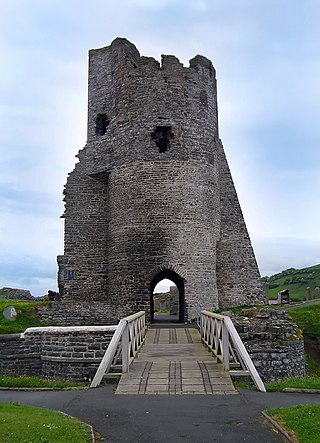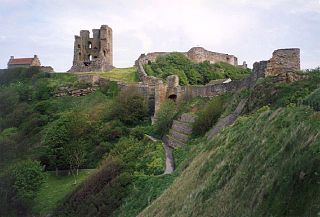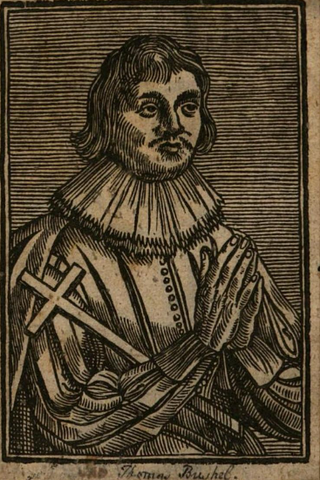Barnabe Barnes was an English poet. He is known for his Petrarchan love sonnets and for his combative personality, involving feuds with other writers and culminating in an alleged attempted murder.

Sir George Yeardley was a planter and colonial governor of the colony of Virginia. He was also among the first slaveowners in Colonial America. A survivor of the Virginia Company of London's ill-fated 1609 Third Supply Mission, whose flagship, the Sea Venture, was shipwrecked on Bermuda for ten months, he is best remembered for presiding over the initial session of the first representative legislative body in Virginia in 1619. With representatives from throughout the settled portion of the colony the group became known as the House of Burgesses and continued to meet, becoming the Virginia General Assembly.

Aberystwyth Castle is a Grade I listed Edwardian fortress located in Aberystwyth, Ceredigion, Mid Wales. It was built in response to the First Welsh War in the late 13th century, replacing an earlier fortress located a mile to the south. During a national uprising by Owain Glyndŵr, the Welsh captured the castle in 1404, but it was recaptured by the English four years later. From 1637 it housed a Royal mint of Charles I, which minted coins from locally mined silver. The castle was slighted by Oliver Cromwell in 1649.
John Alured (1607–1651) was an army officer who fought for the parliamentary cause in the English Civil War and was one of the regicides of King Charles I in 1649.

Thomas Belasyse, 1st Earl Fauconberg PC was an English peer. He supported the Parliamentary cause in the English Civil War, becoming close to Oliver Cromwell and marrying Cromwell's third daughter, Mary. After the Restoration of the monarchy he became a member of the Privy Council to Charles II and was elevated to an earldom by William III.
Browne is a variant of the English surname Brown, meaning "brown-haired" or "brown-skinned". It may sometimes be derived from French le Brun with similar meaning. The Mac an Bhreitheamhnaigh clan of County Donegal have anglicized as Browne since about 1800. The name has also been used throughout North America as an anglicization of the Spanish surname Pardo.

Scarborough Castle is a former medieval royal fortress situated on a rocky promontory overlooking the North Sea and Scarborough, North Yorkshire, England. The site of the castle, encompassing the Iron Age settlement, Roman signal station, an Anglo-Scandinavian settlement and chapel, the 12th-century enclosure castle and 18th-century battery, is a scheduled monument of national importance.
Sir Thomas Honywood was an English soldier during the English Civil War and later a Member of Parliament and also called to Parliament as Thomas, Lord Honywood. He was seated at Marks Hall, Essex.
Bushell is a surname of English origin. The name refers to:
Richard Salwey was an English politician who sat in the House of Commons variously between 1645 and 1659. He was a republican in politics and fought on the Parliamentary side in the English Civil War.
Sir Miles Fleetwood of Aldwinkle, Northamptonshire was an English office-holder and politician who sat in the House of Commons at various times between 1614 and 1641.

Katherine Stanhope, Countess of Chesterfield (1609–1667) was an English courtier. She was the governess and confidante of Mary, Princess Royal and Princess of Orange, and the first woman to hold the office of Postmaster General of England (1664–1667).

The Great Siege of Scarborough Castle was a major conflict for control of one of England's most important stone fortresses during the First English Civil War fought between the Parliamentarians and the Royalists loyal to King Charles I. In February 1645, Parliamentarians laid siege to Scarborough Castle. For five months, they bombarded it, destroying most of the keep, and engaged in bloody fighting before the defenders finally surrendered.
Temperance Flowerdew, Lady Yeardley was an early settler of the Jamestown Colony and a key member of the Flowerdew family, significant participants in the history of Jamestown. Temperance Flowerdew was wife of two Governors of Virginia, sister of another early colonist, aunt to a representative at the first General Assembly and "cousin-german" to the Secretary to the Colony.
Henry Poole (1590-1645) was an English politician who sat in the House of Commons variously between 1624 and 1640.
Lieutenant Colonel Sir William Morton KS was an English judge and politician who sat in the House of Commons in 1640 and from 1663 to 1665. He fought on the Royalist side in the English Civil War.

Thomas Bushell was a servant of Francis Bacon who went on to become a mining engineer and defender of Lundy Island for the Royalist cause during the Civil War. He had an interest in solitary and penitential living which has led him to be identified as a forerunner of the secular hermits of the Georgian period.
Sir Hamon le Strange was an English politician who sat in the House of Commons at various times between 1614 and 1626. He supported the Royalist cause in the English Civil War. His family were Norfolk gentry long based at their manor of Hunstanton.
Sir Barnabas Scudamore (1609–1651) was an English military commander and active Royalist during the English Civil War. The son of James Scudamore and younger brother of Viscount Scudamore, he was from a prominent Herefordshire landowning family. His family's seat was at Holme Lacy.






